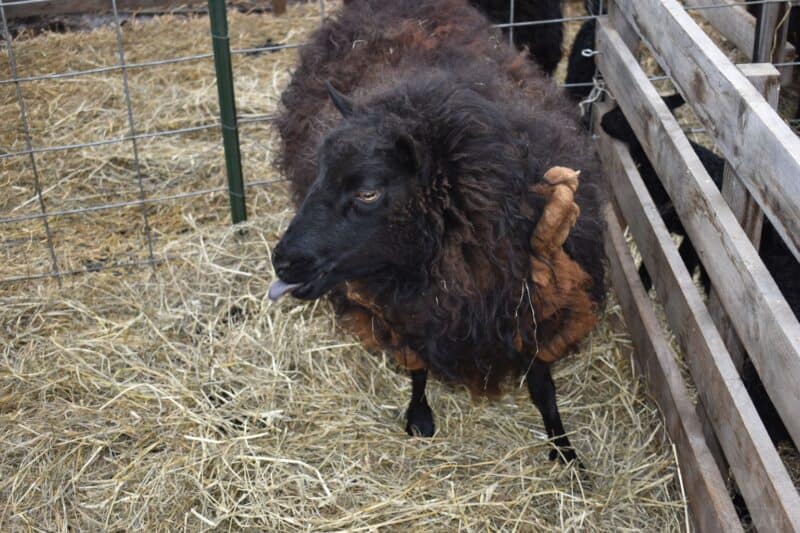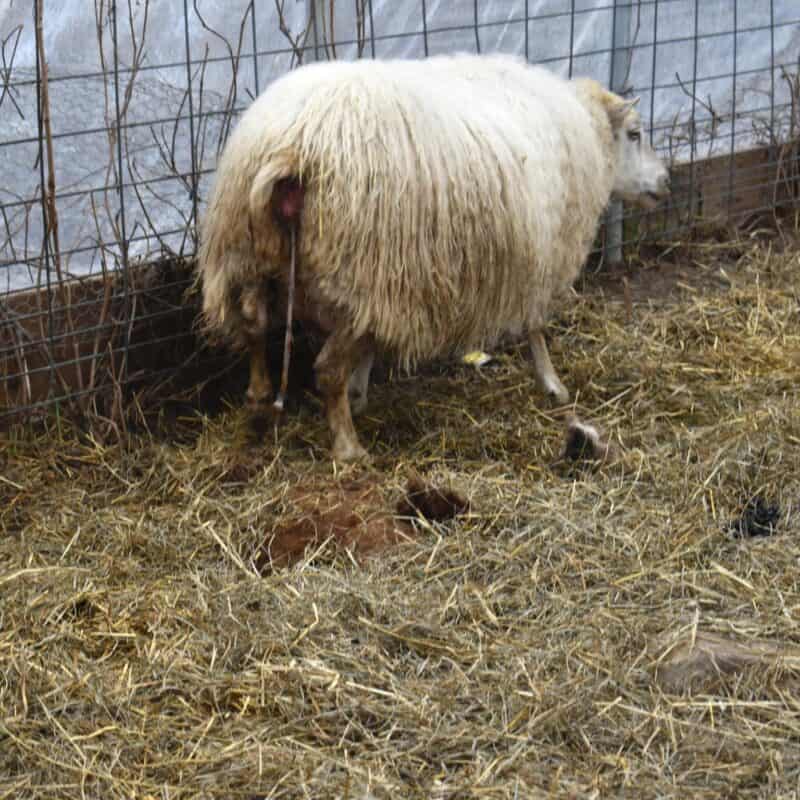[ad_1]
If you take care of animals on your farm or homestead, the miracle of birth is always an exciting but very busy time. There’s going to be a whole lot to do in the coming days, and more than that pregnant animals need special care and often special accommodations as the big day draws near.

This can make the sometimes delicate logistical balance around your property downright stressful.
The first thing you need to know is how long that little bun is going to stay in the oven so you can plan accordingly. Let’s look at sheep: how long will a mother sheep stay pregnant?
A sheep or ewe will stay pregnant about 5 months, or 147 days on average. There’s some variability depending on the health of the mother, the breed of sheep, and other factors.
Sheep are pregnant for a fair bit of time, though nowhere near as long as cows, for instance.
You’ve got time to prepare and get your affairs in order before the precious newborn lamb arrives, but you can’t dilly dally: that 5 months will go by very quick!
Keep reading and I’ll tell you a lot more that you’ll need to know about the gestation period of sheep and other related facts.
How Many Months Will a Sheep Stay Pregnant?
A ewe, or female sheep, stays pregnant for around five months. During this time, the ewe carries her lambs, which develop and steadily grow until they are ready to be born and soon after join the flock.
The precise time that a sheep is pregnant is somewhat variable, but 5 months is a reliable benchmark.
So How Many Days Will a Sheep be Pregnant?
In terms of days, a ewe will typically be pregnant for an average of about 147 days. This is roughly equivalent to five months.
However, this can vary slightly, with the gestation period ranging from 144 to 152 days without expectation of serious complications.
Do keep in mind though that as with any animal, diet, health, age, breed, number of lambs, and environmental stressors (or lack thereof) will influence the exact length of the gestation period. More on those in a bit…

How Long Does it Take for a Sheep to Actually Deliver?
The actual process of labor and delivery in sheep, known as parturition, usually only takes a few hours, anywhere from 1 to 3 on average.
However, it might take a full day, though the longer labor takes the more likely it is there are serious problems with the ewe or the lamb or lambs.
Again, the duration of labor depends on many factors including the ewe’s health, the number of lambs she is carrying, and whether or not she has given birth before. First-time mothers may take longer than ewes which have lambed before.
In all cases, it’s critical that you monitor the ewe when she gets closer to her suspected due date, and during labor, to ensure she and her lambs are delivered safe and healthy.
If labor is going on a long time, you’ll want to intervene or seek veterinary assistance.
What Factors Influence How Long a Sheep Will Be Pregnant?
As you might expect, many factors can influence the duration of pregnancy. One of the most significant ones is nutrition.
Just like in humans, a well-nourished ewe tends to have a healthier and more predictable pregnancy.
Additionally, the breed, size, and age of the ewe all play a part.
How Old Does a Ewe Have to Be to Get Pregnant?
Ewes reach sexual maturity and are able to conceive when they’re between just six to eight months old. Be prepared, because she can and will get pregnant at this age if you don’t take precautions!
However, if planning to breed your animal, you’d be wise to wait until the ewe is at least one year old before breeding her.
This short delay allows the ewe to reach her full size and physical maturity and reduces the risk of complications during the subsequent pregnancy and birth.
Are Sheep Fertile at All Times?
Sometimes. Sheep are polyestrous seasonal breeders. This means they are at peak fertility in a specific season (the fall) but most still enter estrus regularly throughout the year, and some remain highly fertile all year long.
Most breeds of sheep come into their breeding season in the fall, when the days start to shorten. This cycle ensures that lambs are born in the spring when conditions are more optimal for survival.
Nonetheless, some breeds show a less pronounced seasonal pattern and may breed almost year-round. Note that this is the exception, rather than the rule, with sheep!
How Often Will a Sheep Go Into Heat?
A ewe will come into “heat”, or estrus, every 16 days or so until she becomes pregnant during her season, even if that season is a year long.
Each period of heat lasts for about 30 hours, plus or minus, during which the ewe is receptive to a male.
You can notice behavioral changes in a ewe during this time, such as increased restlessness and vocalization, which signals to prospective mates that she is ready to mate!
How Many Lambs Will a Sheep Carry at Once?
Usually 1 or 2. Most commonly a ewe will give birth to just 1 or two 2 at a time, but it’s not unheard of for a healthy ewe to occasionally have 3 lambs during one pregnancy, although this typically increases the chance of complications significantly.
The chance of a larger “litter” is largely dependent on genetics and chance, though also on the breed of the sheep and the ewe’s age, health and nutritional status.
Remember: multiple births can pose a greater risk to the ewe and to the lambs, so it’s even more important for you to identify a multiple birth early, especially triplets, and provide the needed care, checkups and nutrition to your ewe if you want here and her lambs to survive.
Can Sheep Get Pregnant Twice in the Same Year?
The answer is, technically, yes. Given that the gestation period for sheep is about five months, it’s possible for a ewe to have two pregnancies in a year.
However, this isn’t ideal for the ewe’s health, and often, farmers will manage their breeding program to prevent this from happening. More on this in the next section.
How Many Lambs Can Sheep Have in a Year?
It depends on the breeding schedule of the shepherd, but most commonly, they can birth 2 to 4 lambs in total per year, depending on how many she has per gestation and how often she is bred.
This is because each pregnancy takes about 5 months.
Now, even though a ewe becomes fertile again quickly after pregnancy, and this can be capitalized on by shepherds, it is rarely a good idea.
Again, rapidly repeated pregnancy is highly taxing on the ewe’s health!
Good shepherds strive to give ewes lots of rest and recovery between lambings, often opting for just one delivery a year. This ensures the well-being of the ewe and ultimately, healthier lambs.
Another thing to keep in mind is that if you breed a ewe too much or too often this significantly increases the chances of her either perishing during birthing, or rejecting her lamb.
This will create additional complications for you because now you’ll have a “bottle baby” or you’ll need to struggle to find a surrogate mother for the newborn lamb.
[ad_2]
Source link
Get more stuff like this
in your inbox
Don't Be Left Unprepared
Thank you for subscribing.
Something went wrong.


